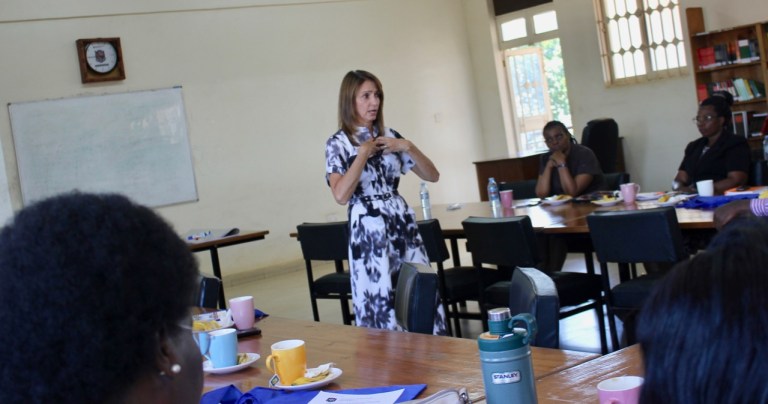By Yasiri J. Kasango and Jimmy Siyasa
At the end of 2021, and following a discussion among the Uganda Christian University (UCU) Council, the former School of Research and Postgraduate Studies was changed to two directorates – Postgraduate Studies, and Research, Partnerships and Innovation.
Assoc. Prof Elizabeth Kukunda Bacwayo, once Dean of the former school, is now Director for Postgraduate Studies. Assoc. Prof. Elizabeth Balyejusa Kizito, former Dean of Faculty of Agricultural Sciences, is Director for the newly designated Research, Partnerships and Innovation.

The Directorate of Research, Partnerships and Innovations focuses on grants, partnerships and innovation aspects of the University. Postgraduate Studies is responsible for the overall coordination and oversight of postgraduate programs, including management of examinations, results, curriculum, admission and registration; and developing and implementing policies, guidelines, regulations and strategies for postgraduate training and research.
At the same time, UCU has moved most of its postgraduate academic programs fully online.
Prof. Bacwayo said the development was supported by the fact that most of the students pursuing postgraduate studies are doing it on a part-time basis, alongside their full-time jobs.
Additionally, the move will help the university to maintain the Standard Operating Procedures – namely social distancing – that reduce chances of the spread of coronavirus.
However, Bacwayo noted that the courses that require students to attend on a full-time basis will not go virtual. These courses include the Master of Research and Public Policy, Master of Arts in Theology and Master of Divinity. These full-time postgraduate programs are largely practical and require students to have physical classes, Bacwayo explained.
Universities and higher institutions of learning re-opened on November 1, 2021, for in-person learning after five months of closure as a result of increase in the Covid-19 infections in Uganda. By the time of closure of education institutions in June 2021, which was followed by a total lockdown on movement, the Covid-19 positivity rate was at 18%.

It was the second lockdown that schools were facing, only after being allowed to re-open in March 2021, after a year of no physical activity due to the Covid-19 pandemic. Primary and secondary schools, all of which were in a lockdown since June 2021, opened their doors to learners on January 10, 2022.
The Dean of the UCU School of Business, Vincent Kisenyi, said they had tried online classes and that the reception by the students “seemed to be good.”
“Most of the post-graduate students prefer online classes because of the level of flexibility,” Kisenyi said, adding that the virtual classes are convenient for international students who do not have to take flights into Uganda to report for classes.
Kisenyi added that the university is set for online classes as it has developed material and curriculum to suit the demands of virtual learning. At a virtual dialogue to discuss the impact of Covid-19 on academic institutions in 2021, UCU Vice Chancellor Aaron Mushengyezi said the institution had “invested in infrastructure of electronic learning” and had something to share with other institutions.
The institution in 2021 received a boost of $50,000 (over sh170m), courtesy of UCU Partners, to help the University expand its e-learning infrastructure.
Many postgraduate students have welcomed the shift to full online classes. Shillah Mukiibi, a student pursuing a Master of Public Administration and Management, said with the online classes, students can still be able to study while at their work stations.
“It is a more convenient way of learning. It gives us time to work as we study,” Mukiibi said. “In fact, it also helps us to save money because a student doesn’t have to pay fees for transport and accommodation.”
On the downside, Irene Nalumu, a student of Master of Business Administration, complained of the “persistently unstable and expensive internet” in Uganda as an impediment to e-learning.


